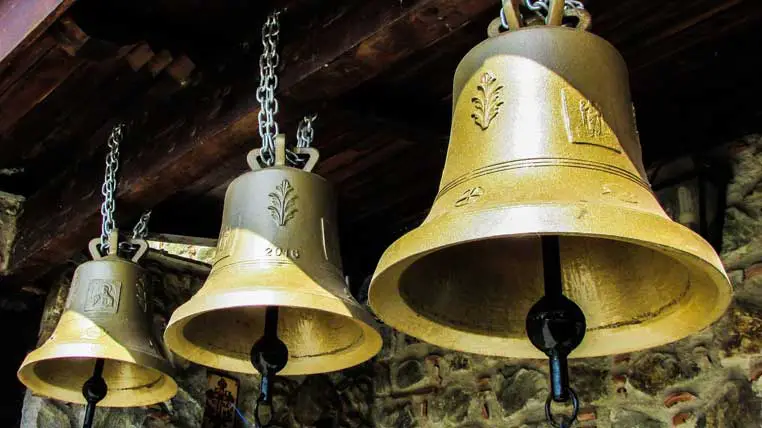Images of deities were often imprinted on bells, and ancient Jews wore bells tied to their clothes to ward off evil spirits.
The origin of bells can be traced back to the time of Moses, as mentioned in chapter 28 of Exodus, verses 33-35, where “a bell of gold” is referenced on the hem of Aaron’s garments, and “the sound thereof shall be heard when he goeth into the holy place before the Lord.”
Bells Spiritual Meaning
Tolling bells for the dead is an ancient custom.
Some experts believe that this custom originates in attempts to drive away evil spirits that haunted the deceased’s body, waiting for the opportune moment to seize the liberated soul from the body.
During antiquity, bells were only rung when important people died. With the advent of Christianity, it became a custom to ring bells during funerals for any parishioner.
In the Middle Ages, church bells were rung during epidemics, hoping to purify the air of disease germs. It was widely believed that these bells had special magical or spiritual powers, primarily due to their proximity to a church.
Suspended between heaven and earth, bells seemed to guard the passage between material and non-material worlds, frightening away demons.
The sacred bell of Buddhists, the ghanta, serves this spiritual expression, similarly warding off negative entities and encouraging good spirits to manifest.
The sound of bells is itself a symbol of creative power.
On the west coast of Africa, a bell used to be tied to the leg of a sick child to ward off evil, while the food was placed away from the child to attract evil spirits there.
Bell Symbolism
Bell symbolism is mainly related to the perception of sound.
In India, for example, the bell symbolizes the ear and what the ear perceives (for instance, the ear can perceive the sound that reflects the primordial vibration).
Thus, most of the sounds perceived during yoga experiences are bell sounds.
In the Islamic world, the sound of the bell represents the subtle sound of the Quranic revelation, the reflection of divine power in existence.
Similarly, the Buddhist Canon seems to assimilate divine voices with the sound of a golden bell.
In China, bell symbolism is associated with thunder and is often linked to the sound of drums. However, the music produced by the bell is uplifting and serves as a criterion of universal harmony.
In contrast to thunder, the bell symbolizes feminine virtues or a magical formula. It is often decorated with the wheel of law, a circle of lotus petals, lions, and laws.
The bell undoubtedly symbolizes the divine call to study the law, submission to the word of God, or in any case, communication between heaven and earth.
A magical bell evokes the dead, made of an alloy obtained from lead, cinnabar, iron, gold, copper, and quicksilver.
The name of Tetragrammaton is inscribed below it. Above it are the names of the seven spirits of the planets, followed by the word Adonal, and on the ring, Jesus.
According to Girardinus Pervilues, to be effective, it is necessary to wrap the bell in a piece of green silk and keep it in that state until the person undertaking the great mystery has the freedom and possibility to place the respective bell in the middle of a grave and leave it there for seven days.
The emanation and sympathy accompanying it remain as long as the bell retains the garment of the cemetery soil. These bring it to the perpetual quality and virtue required when ringing it for this purpose.
The use of bells has evolved to serve a practical purpose – to warn of a customer’s entry through the shop door.
But before their utilitarian function, bells were used to keep evil spirits from entering a house or shop.

Bells Against Demons and Evil Spirits
According to ancient legends, the devil despises all that is beautiful, and bells, with their enchanting sounds, were often used to draw attention to God’s divine nature.
In folklore, evil spirits fear bells and flee from the sound they produce.
This belief is thought to have originated from the idea that legions of devils loiter in the air, waiting to possess mortals’ bodies or create catastrophic storms.
In the book “Golden Legend of Jacobus de Voragine, Archbishop of Genoa,” printed by Caxton around 1483, we can read the following:
The evil spirits that roam the air are terrified by bells ringing; thus, bells are rung when there is thunder or a tremendous or destructive manifestation of the weather. The devils and evil spirits are afraid of the sound of the bells and flee, thereby calming the storms.
“Rationale Divinorum Officiorum,” written by Druandus in 1459, analyzes the origin and meaning of church services, discussing the use of bells against approaching storms so that devils, upon hearing the trumpets of the Eternal King, flee and cease to create a tempest.
Bells used in churches are consecrated and blessed.
Old church texts (dating from the 16th century) speak of the holy ritual blessings of bells. Later, they were used to drive away devils and demons from the air.
Many old bells in Great Britain were inscribed with the sign of the cross and the text: “With my voice alive, I drive away all evil.”
Since ancient Roman times, bronze bells have been used to repel demons.
The geographer Strabo (64 or 63 BC-23 AD) recorded that Roman shepherds attached bells to the necks of their animals to keep away evil spirits and wild beasts.
The Roman poet Ovid (43 BC-17 AD) notes that people would beat bronze vessels during an eclipse or at the death of a relative or acquaintance to scare away demons.
At Ancient Theory we only use trusted sources to document our articles. Such relevant sources include authentic documents, newspaper and magazine articles, established authors, or reputable websites.
- Devils - Afraid of Bells. encyclopedia.com. [Source]
- Something About Bells. scientificamerican.com.
- M. H. Spielmann - Bells and Their Legends. gutenberg.org.
- Jacobus de Voragine - The Golden Legend. The Internet Sacred Texts Archive.
- Guillaume Durand - Rationale Divinorum Officiorum.
- Alexander J. Ellis - Bells and Their Religious Significance.






